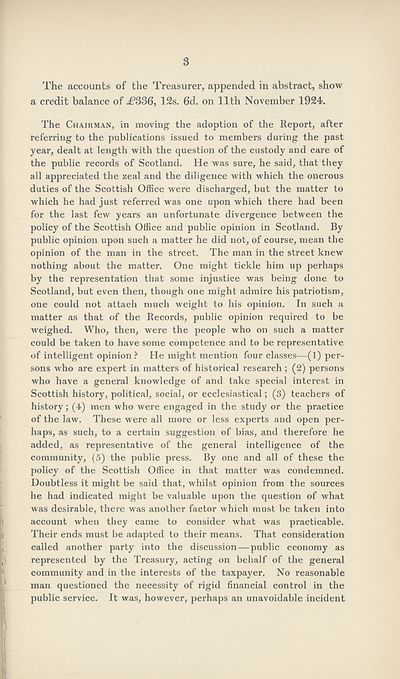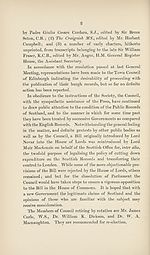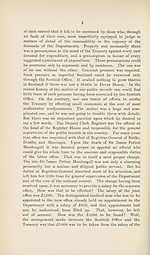Series 3 > Foreign correspondence with Marie de Lorraine, Queen of Scotland, from the originals in the Balcarres papers > Volume 7
(406) Page 3
Download files
Complete book:
Individual page:
Thumbnail gallery: Grid view | List view

3
The accounts of the Treasurer, appended in abstract, show
a credit balance of £336, 12s. 6d. on 11th November 1924.
The Chairman, in moving the adoption of the Report, after
referring to the publications issued to members during the past
year, dealt at length with the question of the custody and care of
the public records of Scotland. He was sure, he said, that they
all appreciated the zeal and the diligence with which the onerous
duties of the Scottish Office were discharged, but the matter to
which he had just referred w'as one upon which there had been
for the last few years an unfortunate divergence between the
policy of the Scottish Office and public opinion in Scotland. By
public opinion upon such a matter he did not, of course, mean the
opinion of the man in the street. The man in the street knew
nothing about the matter. One might tickle him up perhaps
by the representation that some injustice was being done to
Scotland, but even then, though one might admire his patriotism,
one could not attach much weight to his opinion. In such a
matter as that of the Records, public opinion required to be
weighed. Who, then, were the people who on such a matter
could be taken to have some competence and to be representative
of intelligent opinion ? He might mention four classes—(1) per¬
sons who are expert in matters of historical research ; (2) persons
who have a general knowledge of and take special interest in
Scottish history, political, social, or ecclesiastical; (3) teachers of
history; (4) men who were engaged in the study or the practice
of the law. These were all more or less experts and open per¬
haps, as such, to a certain suggestion of bias, and therefore he
added, as representative of the general intelligence of the
community, (5) the public press. By one and all of these the
policy of the Scottish Office in that matter was condemned.
Doubtless it might be said that, whilst opinion from the sources
he had indicated might be valuable upon the question of what
was desirable, there was another factor which must be taken into
account when they came to consider what was practicable.
Their ends must be adapted to their means. That consideration
called another party into the discussion — public economy as
represented by the Treasury, acting on behalf of the general
community and in the interests of the taxpayer. No reasonable
man questioned the necessity of rigid financial control in the
public service. It was, however, perhaps an unavoidable incident
The accounts of the Treasurer, appended in abstract, show
a credit balance of £336, 12s. 6d. on 11th November 1924.
The Chairman, in moving the adoption of the Report, after
referring to the publications issued to members during the past
year, dealt at length with the question of the custody and care of
the public records of Scotland. He was sure, he said, that they
all appreciated the zeal and the diligence with which the onerous
duties of the Scottish Office were discharged, but the matter to
which he had just referred w'as one upon which there had been
for the last few years an unfortunate divergence between the
policy of the Scottish Office and public opinion in Scotland. By
public opinion upon such a matter he did not, of course, mean the
opinion of the man in the street. The man in the street knew
nothing about the matter. One might tickle him up perhaps
by the representation that some injustice was being done to
Scotland, but even then, though one might admire his patriotism,
one could not attach much weight to his opinion. In such a
matter as that of the Records, public opinion required to be
weighed. Who, then, were the people who on such a matter
could be taken to have some competence and to be representative
of intelligent opinion ? He might mention four classes—(1) per¬
sons who are expert in matters of historical research ; (2) persons
who have a general knowledge of and take special interest in
Scottish history, political, social, or ecclesiastical; (3) teachers of
history; (4) men who were engaged in the study or the practice
of the law. These were all more or less experts and open per¬
haps, as such, to a certain suggestion of bias, and therefore he
added, as representative of the general intelligence of the
community, (5) the public press. By one and all of these the
policy of the Scottish Office in that matter was condemned.
Doubtless it might be said that, whilst opinion from the sources
he had indicated might be valuable upon the question of what
was desirable, there was another factor which must be taken into
account when they came to consider what was practicable.
Their ends must be adapted to their means. That consideration
called another party into the discussion — public economy as
represented by the Treasury, acting on behalf of the general
community and in the interests of the taxpayer. No reasonable
man questioned the necessity of rigid financial control in the
public service. It was, however, perhaps an unavoidable incident
Set display mode to:
![]() Universal Viewer |
Universal Viewer | ![]() Mirador |
Large image | Transcription
Mirador |
Large image | Transcription
Images and transcriptions on this page, including medium image downloads, may be used under the Creative Commons Attribution 4.0 International Licence unless otherwise stated. ![]()
| Scottish History Society volumes > Series 3 > Foreign correspondence with Marie de Lorraine, Queen of Scotland, from the originals in the Balcarres papers > Volume 7 > (406) Page 3 |
|---|
| Permanent URL | https://digital.nls.uk/127218825 |
|---|
| Shelfmark | SCS.SHS.88 |
|---|---|
| Attribution and copyright: |
|
| Attribution and copyright: |
|
|---|
| Description | Over 180 volumes, published by the Scottish History Society, containing original sources on Scotland's history and people. With a wide range of subjects, the books collectively cover all periods from the 12th to 20th centuries, and reflect changing trends in Scottish history. Sources are accompanied by scholarly interpretation, references and bibliographies. Volumes are usually published annually, and more digitised volumes will be added as they become available. |
|---|


